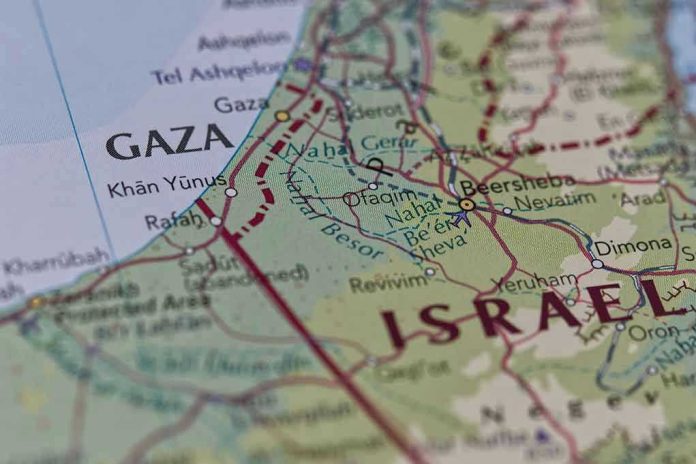
President Trump unveiled a groundbreaking 20-point peace plan to end the Israel-Hamas war, with Netanyahu joining White House talks that could finally bring stability to a region plagued by decades of conflict.
Story Highlights
- Trump announces comprehensive 20-point Gaza ceasefire plan during Netanyahu’s White House visit
- Plan includes phased withdrawal, humanitarian corridors, prisoner exchanges, and reconstruction framework
- Netanyahu commits Israel to peace negotiations while maintaining security guarantees
- Hamas response remains skeptical, demanding end to blockade and political recognition
Trump’s Bold Peace Initiative Takes Center Stage
President Trump presented his ambitious 20-point Gaza ceasefire plan during a high-profile White House summit with Israeli Prime Minister Benjamin Netanyahu. The comprehensive proposal outlines immediate ceasefire measures, humanitarian corridor establishment, and a phased approach to regional stability. Trump emphasized this represents a “historic opportunity for peace and stability in the Middle East,” positioning himself as the dealmaker who can succeed where previous administrations failed.
Netanyahu Commits to Security-First Negotiations
Netanyahu’s participation in the White House talks demonstrates Israel’s willingness to engage in serious peace negotiations while maintaining non-negotiable security requirements. The Israeli Prime Minister stated that “Israel is committed to peace, but our security must be guaranteed,” reflecting concerns from Israeli conservatives who worry about potential security concessions. Netanyahu faces domestic pressure from right-wing coalition partners who remain skeptical of any agreement that could compromise Israel’s defensive capabilities against future Hamas attacks.
Plan Details Reveal Comprehensive Framework
The 20-point plan addresses immediate humanitarian needs through established corridors for aid delivery to Gaza civilians while creating mechanisms for prisoner exchanges between Israel and Hamas. Technical teams from both sides are working on implementation details, though sporadic violence continues despite ongoing negotiations. The framework includes provisions for international monitoring and guarantees, addressing concerns raised by diplomatic experts about the need for third-party oversight to ensure compliance from all parties involved.
Regional Reactions Signal Mixed International Response
International reactions remain cautiously optimistic, with EU and UN officials expressing measured support while Arab states show varying degrees of backing for the initiative. Hamas leadership has responded with initial skepticism, demanding concrete guarantees about ending the Gaza blockade and achieving political recognition. Iran and hardline groups have criticized the proposal, raising concerns about potential spoilers who could undermine ceasefire efforts through continued violence or political obstruction.
Middle East analysts note the cyclical nature of Israel-Hamas conflicts and emphasize that lasting peace requires addressing core issues including borders, refugees, and Jerusalem’s status. The success of Trump’s peace plan will depend on Hamas’s willingness to negotiate in good faith and Israel’s ability to balance security concerns with humanitarian obligations, while international mediators like Egypt and Qatar work to maintain diplomatic momentum.
Sources:
BBC News – Middle East Conflict Analysis
UN Office for the Coordination of Humanitarian Affairs







